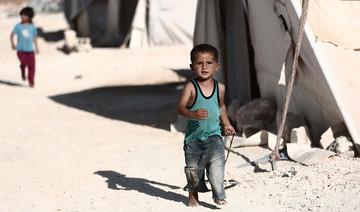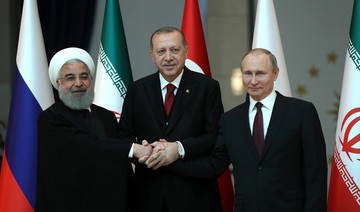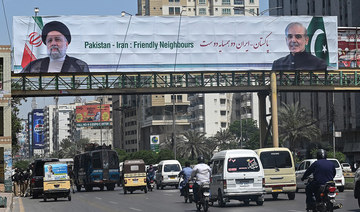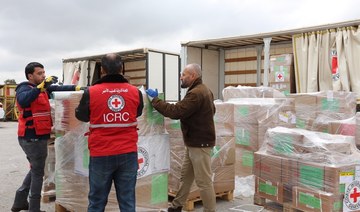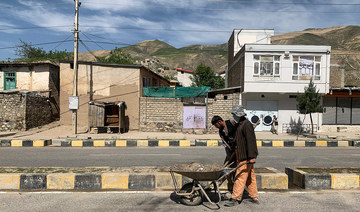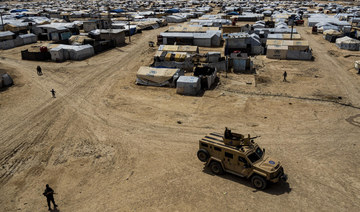TEHRAN, Iran: The presidents of Iran, Russia and Turkey met Friday in Tehran to discuss the war in Syria, with all eyes on a possible military offensive to retake the last rebel-held bastion of Idlib.
The summit between Iranian President Hassan Rouhani, Russian President Vladimir Putin and Turkish President Recep Tayyip Erdogan may determine whether diplomacy halts any military action. Even before it began, an airstrike early Friday struck Idlib’s southern edge, killing at least one person.
The leaders each held bilateral talks before the meeting began in Tehran. As photographers took pictures of the three leaders Rouhani, smiling, reached for both of their hands.
Turkish President Recep Tayyip Erdogan said Friday at the meeting that an attack on Idlib would result in a disaster and massacre, and that millions of people would be moving towards the Turkish border in the case that an attack took place.
Erdogan continued by saying that a rational solution in Idlib that will address everyone’s concerns needs to found.
Meanwhile, Russian President Vladimir Putin said that the Syrian government should restore control over all of its territory.
The UN peace envoy for Syria on Friday called for evacuation corridors to be opened for civilians to flee the looming Syrian offensive in rebel-held Idlib province that could lead to a "horrific and bloody battle."
The United Nations has warned of a humanitarian disaster if Syria forces, backed by Russia and Iran, launch an all-out attack in Idlib, the last major rebel bastion.
"People should be granted safe passage to places of their own choosing if they want to leave," Staffan de Mistura told a Security Council meeting on the crisis in Idlib.
"We must allow the opening of sufficient number of protected voluntary evacuation routes for civilians in any direction: east, north and south," he said, adding that the United Nations would establish a presence there.
Each of the three nations has its own interests in the years-long war in Syria.
Iran wants to keep its foothold in the Mediterranean nation neighboring Israel and Lebanon. Turkey, which backed opposition forces against Syrian President Bashar Assad, fears a flood of refugees fleeing a military offensive and destabilizing areas it now holds in Syria. And Russia wants to maintain its regional presence to fill the vacuum left by America’s long uncertainty about what it wants in the conflict.
“The Tehran summit can produce peace and reconciliation in Syria or it can deepen the mess created by endless bouts of violence mainly instigated by the Assad regime,” Ilnur Cevik, a senior adviser to Erdogan, wrote in the Daily Sabah newspaper.
Northwestern Idlib province and surrounding areas are home to about 3 million people — nearly half of them civilians displaced from other parts of Syria. That also includes an estimated 10,000 hard-core fighters, including Al-Qaeda-linked militants.
For Russia and Iran, both allies of the Syrian government, retaking Idlib is crucial to complete what they see as a military victory in Syria’s civil war after Syrian troops recaptured nearly all other major towns and cities, largely defeating the rebellion against Assad.
A bloody offensive that creates a massive wave of death and displacement, however, runs counter to their narrative that the situation in Syria is normalizing, and could hurt Russia’s longer-term efforts to encourage the return of refugees and get Western countries to invest in Syria’s postwar reconstruction.
The streets of Tehran were quiet on Friday, the second day of the Iranian weekend. The country’s state-run IRNA news agency described the summit as potentially offering an “agreement on peace and security” in Syria.
A former Iranian diplomat, Ali Akbar Farazi, told IRNA the summit shows that solving regional issues “in a fair way that agrees with the interests of all sides” remains important for the three nations.
For Turkey, the stakes couldn’t be higher. Turkey already hosts 3.5 million Syrian refugees and has sealed its borders to newcomers. It has also created zones of control in northern Syria and has several hundred troops deployed at 12 observation posts in Idlib. A government assault creates a nightmare scenario of potentially hundreds of thousands of people, including militants, fleeing toward its border and destabilizing towns and cities in northern Syria under its control.
Naji Al-Mustafa, a spokesman for the Turkey-backed National Front for Liberation, said Friday his fighters were prepared for a battle that they expect will spark a major humanitarian crisis.
“The least the summit can do is to prevent this military war,” he said.
Early on Friday, a series of airstrikes struck villages in southwest Idlib, targeting insurgent posts and killing a fighter, said Rami Abdurrahman, the head of the Britain-based Syrian Observatory for Human Rights. Abdurrahman said suspected Russian warplanes carried out the attack.
Turkey also doesn’t want to see another Kurdish-controlled area rise along its border, as it already faces in northern Iraq.
Cevik, a senior adviser to Erdogan, also didn’t pull any punches in his piece in the Daily Sabah, saying: “Assad bolstered by Iran’s land assets and Russian air power and his use of chemical weapons has punched his way into opposition strongholds and hence massive gains for the Damascus regime.
“You still need moderate opposition groups who represent the Sunni suffering masses in Syria to achieve a viable political solution and durable peace in this country,” he wrote. “Iran and Russia are the fighting forces in Syria and have brought blood and tears.”
All three nations face sanctions from the US under the administration of President Donald Trump. Although America has some 2,000 troops and outposts in Syria, Trump has said he wants to pull those forces out after the war against the Daesh group dislodged the extremists from vast territories it once held there and in Iraq.
America’s ambassador to the United Nations, Nikki Haley, has warned any military offensive in Idlib “would be a reckless escalation.” The US will chair a UN Security Council meeting Friday about the possible offensive.
“There is no military solution to the Syrian conflict,” Haley said in a statement Wednesday. “Assad’s brutal regime — backed by Russia and Iran — cannot continue to attack and terrorize Syria’s citizens.”



